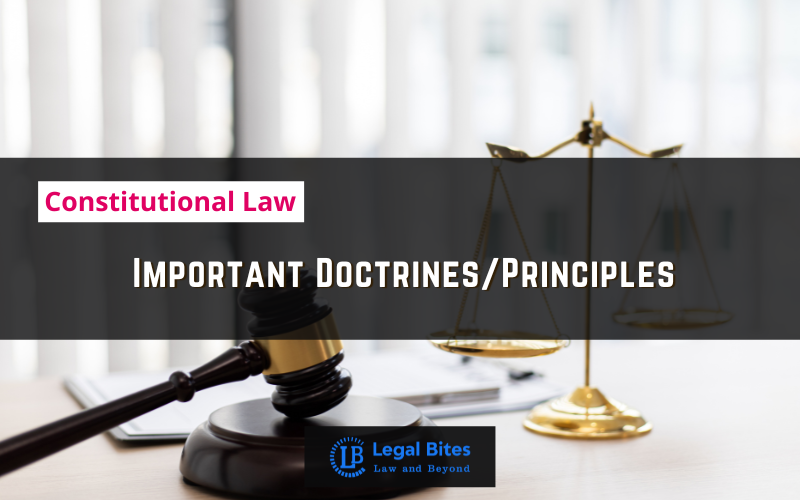What do you understand by Judicial Review? What is the effect of Article 13 on Pre-constitutional laws and Post-constitutional laws?
Find the answer to the mains question of Constitutional Law only on Legal Bites.;

Question: What do you understand by Judicial Review? What is the effect of Article 13 on Pre-constitutional laws and Post-constitutional laws? Explain your answer with the help of decided cases. [UPJS 2013] Find the answer to the mains question of Constitutional Law only on Legal Bites. [What do you understand by Judicial Review? What is the effect of Article 13 on Pre-constitutional laws and Post-constitutional laws? Explain your answer with the help of decided cases.] Answer ...
Question: What do you understand by Judicial Review? What is the effect of Article 13 on Pre-constitutional laws and Post-constitutional laws? Explain your answer with the help of decided cases. [UPJS 2013]
Find the answer to the mains question of Constitutional Law only on Legal Bites. [What do you understand by Judicial Review? What is the effect of Article 13 on Pre-constitutional laws and Post-constitutional laws? Explain your answer with the help of decided cases.]
Answer
Judicial Review refers to the power of the judiciary to examine the constitutionality of legislative and executive actions. If found inconsistent with the Constitution, the judiciary has the authority to declare such actions void. Justice Khanna, in Kesavananda Bharati v. State of Kerala (AIR 1973 SC 1461), emphasized that judicial review is an integral part of India's constitutional framework. Both the Supreme Court and High Courts have been vested with this power under Articles 32 and 226, respectively.
The Supreme Court in the Kesavananda Bharati case also introduced the basic structure doctrine, stating that while the legislature can amend the Constitution, it cannot alter its basic structure. This was further reaffirmed in S.P. Sampath Kumar v. Union of India [1987 SCR (3) 233], where the Court held judicial review to be a basic and essential feature of the Constitution. Any law excluding judicial review without providing an effective alternative mechanism would violate the basic structure and thus be unconstitutional.
Article 13 ensures the supremacy of fundamental rights over other laws. It declares that any law inconsistent with or derogatory to fundamental rights shall be void to the extent of the inconsistency.
Article 13(1) states that laws in force before the commencement of the Constitution, if inconsistent with fundamental rights, become void to the extent of the inconsistency. However, such laws are not void ab initio. Their invalidity operates prospectively from the date of the Constitution's commencement (26th January 1950).
This principle was discussed in Keshav Madhav Menon v. State of Bombay, AIR 1951 SC 128. The petitioner, charged under a pre-Constitutional law for publishing a pamphlet in 1949, argued for protection under Article 19(1)(a). The Supreme Court held that since the act was committed before the Constitution's commencement, the benefit of Article 13 could not be applied retrospectively. Thus, pre-constitutional laws inconsistent with Part III become void only prospectively.
Article 13(2) mandates that the State shall not enact laws contravening fundamental rights, and any such law shall be void ab initio. Convictions or actions under such laws are wholly illegal and must be set aside, as they violate fundamental rights from their inception. However, such laws are not entirely removed from the statute book—they remain applicable to individuals not protected by the fundamental rights in question.
Judicial review ensures that both pre-constitutional and post-constitutional laws conform to fundamental rights. In the case of pre-Constitutional laws, invalidity applies prospectively, while for post-Constitutional laws, the invalidity is immediate and retroactive. This dual approach reinforces the constitutional protection of fundamental rights, as demonstrated in landmark cases like Kesavananda Bharati and Keshav Madhav Menon.
Important Mains Questions Series for Judiciary, APO & University Exams
- Constitutional Law Mains Questions Series Part-I
- Constitutional Law Mains Questions Series Part-I
- Constitutional Law Mains Questions Series Part-II
- Constitutional Law Mains Questions Series Part-IV
- Constitutional Law Mains Questions Series Part-V
- Constitutional Law Mains Questions Series Part-VI
- Constitutional Law Mains Questions Series Part-VII
- Constitutional Law Mains Questions Series Part-VIII
- Constitutional Law Mains Questions Series Part-IX
- Constitutional Law Mains Questions Series Part-X



